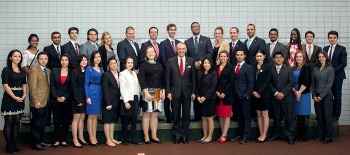By Tornike Zurabashvili*
We often hear that youth participation in decision-making processes should increase, but very rarely do we ask ourselves the question of how we should participate or what would be the extent and degree of our participation. The answer to this question is rather simple: no decision or action on problems facing the young people should be taken without engaging youth. United Nations has long championed these ideals in its official proceedings and among its many other initiatives, UN Youth Delegate Programme has stood as one of the oldest and the most meaningful mechanisms for youth engagement at the global level.
It has been three decades that the United Nation recommending Member States to include youth representatives in their national delegations to the General Assembly and other relevant UN conferences. Although the programme is coordinated by the United Nations Focal Point on Youth (a part of the Division for Social Policy and Development in the Department of Economic and Social Affairs), Youth Delegate’s role in general, is determined by the authority in charge of youth affairs in a country, in partnership with the Ministry of Foreign Affairs and the country's Permanent Mission to the United Nations.
Similarly, selection processes might vary country to country and individual Member States get to decide on how to identify youth delegate/s. The underlying principle is that the selected young persons need to have credible mandate and knowledge to represent youth of their countries. In the Georgian case, the representatives of the Ministry of Foreign Affairs and the Ministry of Sports & Youth Affairs together with the incumbent Youth Delegate operate the entire selection process and determine the specific role and mandate of the youth delegate. In Georgia, a Youth Delegate is recruited through an open call, starting in April and involves three rounds of selection process stretching all the way to June. In the first round, applicants are required to submit their resume and an essay on a youth-related topic while in the second round candidates are interviewed by the selection committee. The last and the decisive step is the public speaking contest, where the shortlisted candidates are given a topic to present before the audience.
It did not take long for me to make up my mind and apply to the programme. The process appeared to be highly competitive; with around 80 candidates at the initial stage of application, the odds of being selected seemed very unfavorable. However, the combination of my previous experience in the field of youth affairs, professional and academic background in international affairs and the passion to represent Georgia’s youth helped me to succeed. Like many other Youth Delegates , before departing for New York, I met hundreds of youngsters through my extensive visits to cities, towns and villages, universities, schools and youth organizations, active student groups and individual youngsters to listen to their ideas and connect them to the work of the United Nations.
In October, following the youth consultations in my home country, I headed to NYC for the 3rd Committee of the United Nations General Assembly, which deals with issues related to social, humanitarian and cultural affairs. Within first few hours of communication with the rest of Youth Delegates, I was assured that we possessed sufficient creativity, motivation and fresh ideas to make our time a memorable experience and our work a valuable outcome for the youth we represented. While all of us had an opportunity of attending Third Committee hearings, some of the Youth Delegates, including me, were allowed to speak in front of 193 Member State representatives, where we voiced the concerns of not only our constituencies but also youth in general.
One more important part of the Youth Delegate’s work at the United Nations is organizing and attending ‘Side Events’ on youth-related matters. Like every year, Youth Delegates organized working meetings on thematic issues including, “Youth Engagement through Culture”, “World Youth Conference in Colombo”, “Children and Youth in Post-Conflict Settings", “LGBT Rights and the UN”, “Youth Participation” “Educational Initiatives” etc. We also had a chance of meeting and sharing our experiences with the UN Deputy Secretary-General Jan Eliasson and UN Secretary General’s Envoy on Youth, Ahmad Alhendawi.
Another engagement opportunity for this year’s delegates was to work on youth-related resolutions, specifically in the form of participation in the informal consultations concerning the resolution on “Policies and Programmes Involving Youth”. This resolution, negotiated by Member States, contains issues pertinent to the situation of young people and outlines ways of addressing these issues. Until the time this article was produced, approximately ten informal consultations had taken place and usually the partakers were the diplomats from Member States along with some Youth Delegates, who were allowed to participate in negotiations on behalf of the respective Member States.
Although negotiations proved to be hard and sometimes frustrating, not only did we get an invaluable experience but also we proved that we are capable of contributing equally as our elder peers and that our voice matters. We left the United Nations at different times but with the same hope that many more countries around the world will follow our suite and empower young people to voice their ideas from the floor of the United Nations. We all remain at your disposal and we will be ready to pave the way for those desiring to join this wonderful program.
For More information about UN Youth Delegate Programme, please visit:
* Tornike Zurabashvili 23, is the Youth Delegate of Georgia to the United Nations. In October 2013, Tornike represented his constituents as an official member of the Georgian Delegation to the UN General Assembly.




 Welcome to the United Nations
Welcome to the United Nations



